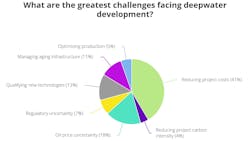Poll results: Reducing project costs the biggest hurdle in deepwater development projects
By Ariana Hurtado, Editor-in-Chief
As offshore energy operations push into deeper waters and more complex environments, the industry faces a growing set of technical, economic and regulatory hurdles. From reducing project costs and carbon intensity to navigating oil price volatility and regulatory uncertainty, each factor plays a critical role in shaping investment decisions, technology adoption and long-term field viability.
Offshore recently polled its readers over a two-week period to assess top deepwater development challenges. Of the 147 poll respondents, the majority (41.5%) voted that project cost reduction was the largest obstacle for teams to overcome.
The poll results were as follows:
| Reducing project costs | 41.5% |
| Oil price uncertainty | 17.69% |
| Qualifying new technologies | 12.93% |
| Managing aging infrastructure | 10.88% |
| Regulatory uncertainty | 7.48% |
| Optimizing production | 5.44% |
| Reducing project carbon intensity | 4.08% |
Offshore is an international resource for the offshore energy industry; thus, our audience and poll participants reflect a worldwide representation of the sector. Half of the participants (50%) were from the US (56% of which were from Texas). The rest of the poll respondents were from Australia, Brazil, Colombia, Czech Republic, Indonesia, Ireland, India, Mexico, Nigeria, Norway, the UAE and the UK.
The majority of poll respondents identified themselves as belonging to a consulting company, independent oil and gas company, or EPC contractor. To name a few, some respondents hailed from Shell, Wood Plc, Subsea7, Yinson, NOV, Vantage Drilling and McDermott, among many other companies.
Most of the individuals (27.78%) identified themselves as executive management (CEO, president, COO, owner, VP, managing director, etc.), while another large chunk of the group (25%) said they were engineers. Nearly 14% said they were in management roles (production manager, engineering manager, exploration manager, etc.), and 11% held consulting titles. The rest of the poll respondents held various positions, from financial personnel and technology executives to field professionals and purchasing managers/agents.
Want more deepwater content?
Deepwater Operations and Topsides, Platforms & Hulls Conference and Exhibition 2025
Join us Nov. 4-6, 2025, as attendees learn and discuss the real-life issues and solutions relevant to deepwater operations and topsides, platforms and hulls. A shared exhibit hall floor will showcase products and services from dozens of key engineering firms, contractors, suppliers and service providers.
About the Author
Ariana Hurtado
Editor-in-Chief
With more than a decade of copy editing, project management and journalism experience, Ariana Hurtado is a seasoned managing editor born and raised in the energy capital of the world—Houston, Texas. She currently serves as editor-in-chief of Offshore, overseeing the editorial team, its content and the brand's growth from a digital perspective.
Utilizing her editorial expertise, she manages digital media for the Offshore team. She also helps create and oversee new special industry reports and revolutionizes existing supplements, while also contributing content to Offshore's magazine, newsletters and website as a copy editor and writer.
Prior to her current role, she served as Offshore's editor and director of special reports from April 2022 to December 2024. Before joining Offshore, she served as senior managing editor of publications with Hart Energy. Prior to her nearly nine years with Hart, she worked on the copy desk as a news editor at the Houston Chronicle.
She graduated magna cum laude with a bachelor's degree in journalism from the University of Houston.

